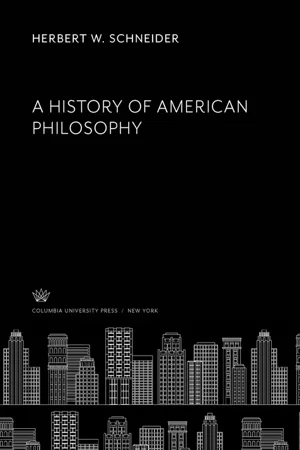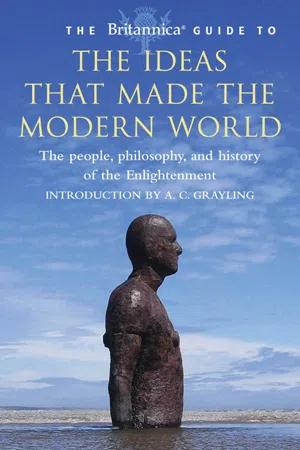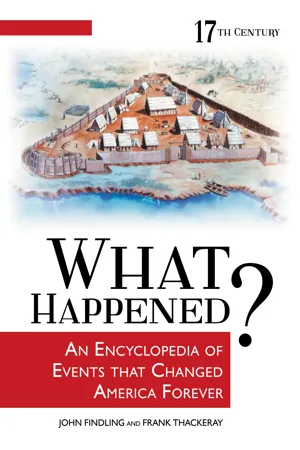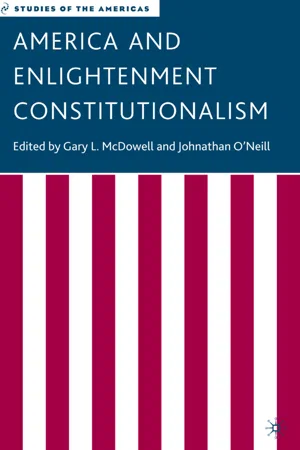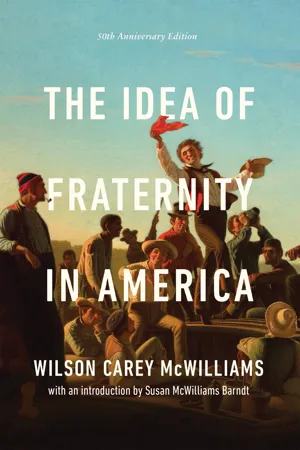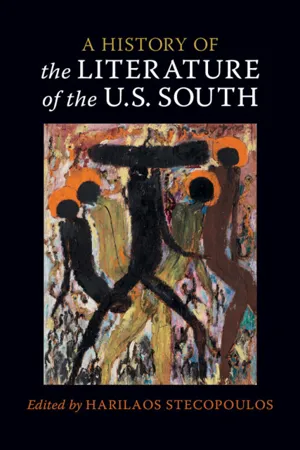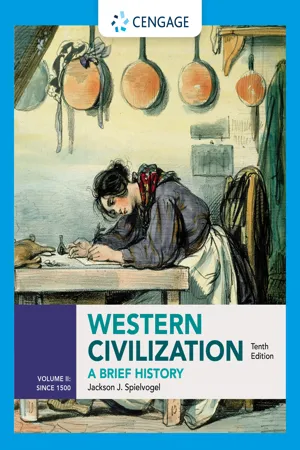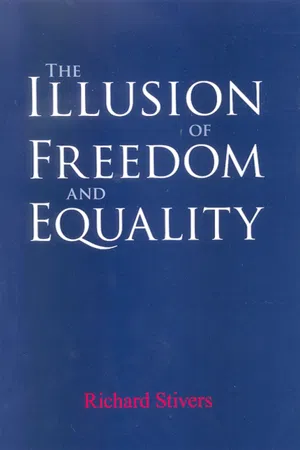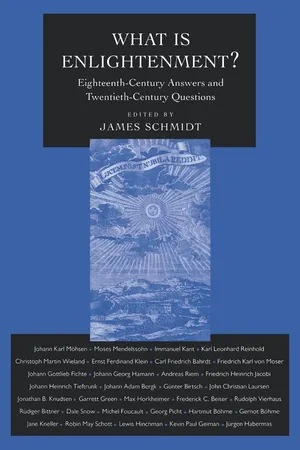History
American Enlightenment
The American Enlightenment was a cultural and intellectual movement in the American colonies during the 18th century. It emphasized reason, science, and individualism, and was influenced by European Enlightenment ideas. Key figures such as Benjamin Franklin, Thomas Jefferson, and Thomas Paine promoted these ideals, which ultimately shaped the founding principles of the United States.
Written by Perlego with AI-assistance
Related key terms
1 of 5
10 Key excerpts on "American Enlightenment"
- eBook - PDF
- Herbert W. Schneider(Author)
- 2019(Publication Date)
- Columbia University Press(Publisher)
THE American Enlightenment T H E Enlightenment is indefinable philosophically, especially in America, where it was least literary and most active. There was no systematic formulation of human reason in this country—no En-cyclopédie, no philosophes, no esprit de système; yet there was no period in our history when the public interests of the people were so intimately linked to philosophic issues. To recapture the intellectual life of the revolutionary generation in America we must turn, not to academic texts or to systems of theology and ethics or to the products of reflective solitude, but to the center of public affairs—to state docu-ments and to political platforms, presses, and pulpits. Never in Amer-ica were philosophical thinking and social action more closely joined. Though much of the philosophizing was ad hoc, finding universal solutions for particular problems, it will not do to dismiss the thought of the Enlightenment as mere rationalization. For the conspicuous fact about American life then was that not only were the eyes and hopes of the world centered on America but also American men of affairs themselves were genuinely concerned with the wider, if not the universal, implications of their interests and deeds. They had, in-deed, a decent respect to the opinions of mankind. It is amazing to see how far into the past and the future they looked in order to under-stand their present. Never was history made more consciously and conscientiously, and seldom since the days of classic Greece has phi-losophy enjoyed greater opportunity to exercise public responsibility. It is impossible to read and write dispassionately of the American Enlightenment, for it contains the heart of our heritage as a people and our deepest tie to the rest of humanity. - eBook - PDF
- Encyclopaedia Britannica, Inc.(Authors)
- 2008(Publication Date)
- Encyclopaedia Britannica, Inc.(Publisher)
1 A HISTORY OF THE ENLIGHTENMENT The Enlightenment (in French the Sie Ácle des Lumie Áres ( ``Age of the Enlightened''), in German Aufkla È rung ) swept through Europe in the 17th and 18th centuries. With new ideas con-cerning God, reason, nature, and man, the Enlightenment offered a world view that gained wide assent and instigated revolutionary developments in art, philosophy, and politics. Central to Enlightenment thought were the use and the cele-bration of reason, the power by which man understands the universe and improves his own condition. The goals of ra-tional man were considered to be knowledge, freedom, and happiness. The Enlightenment was both a movement and a state of mind. The term represents a phase in the intellectual history of Europe, but it also serves to define the programmes of reform advocated by influential French writers, philosophers, and scientists, known as ``philosophes'', who were inspired by a common faith in the possibility of a better world. The special significance of the Enlightenment lies in its combination of principle and pragmatism. There are two traditional schools of thought regarding its character and achievements. The first sees the Enlightenment as the preserve of an elite centred on Paris and as primarily a French movement, while the second perceives it as an inter-national phenomenon with as many facets as there were countries affected. Although most modern interpreters incline to the latter view, there is still a case for the French emphasis, given the genius of a number of the philosophes and their associates. Unlike other terms applied by historians ``the Enlightenment'' was used and cherished by those who believed in the power of the mind to liberate and improve. - eBook - PDF
- John E. Findling, Frank W. Thackeray, John E. Findling, Frank W. Thackeray(Authors)
- 2010(Publication Date)
- ABC-CLIO(Publisher)
May, Henry F. The Enlightenment in America. New York: Oxford University Press, . This is the classic study of Americans’ appropriation and adaptation of European Enlightenment ideals. Schmidt, Leigh Eric. Hearing Things: Religion, Illusion, and the American Enlightenment. Cam- bridge, MA: Harvard University Press, . This study is highly interdisciplinary, making an argument about the importance of the diverse range of sounds and their links to the experi- ence of religious practice during the Age of Reason. Staloff, Darren. Hamilton, Adams, Jefferson: The Politics of Enlightenment and the American Founding. New York: Hill and Wang, . Staloff provides a strong overview of the Enlight- enment and then connects selected Founding Fathers to it their careers and writings. AMERICAN PHILOSOPHICAL SOCIETY The American Philosophical Society was a group devoted to the pursuit of scientific and philosophical understanding, as well as to the dissemination of that understanding to a wider public. The American Philosophical Society was important in th-century North America because it showed that a distinctly American science had arisen with an emphasis on practical knowledge, in contrast to the predominantly speculative science of Europe. The American Philosophical Society is traditionally associated with Benjamin Franklin, but it was not wholly Franklin’s creation. In , the Philadelphia botanist John Bartram urged his “ingenious and curious” friends to create a society to study “natural secrets, arts, and sciences.” Three years later, Franklin attended a series of lec- tures in Boston on “experimental philosophy,” given by the Scottish physician Archibald Spencer. The scientific experiments that Spencer performed inspired Franklin, who re- turned to Philadelphia and took full credit for forming the society that Bartram had envisioned. The American Philosophical Society, founded by Franklin in , was modeled after the Royal Society of London. - eBook - PDF
- G. McDowell, J. O'Neill, G. McDowell, J. O'Neill(Authors)
- 2006(Publication Date)
- Palgrave Macmillan(Publisher)
They thought they had ample reasons for their confidence. They may not have been correct in their reasoning, but it is important for us to know why they thought as they did. By doing so we can understand not only something about the origins of the United States but also some- thing of what the Enlightenment meant to many people in the eighteenth-century Atlantic world. Americans had no doubt that they were living in an age of Enlightenment. Everywhere the boundaries of darkness and ignorance were being pushed back and light and reason were being extended outward. More than most people in the Atlantic world Americans were keenly aware that savagery and barbarism were giving way to American Enlightenment 161 refinement and civilization. Precisely because they were provincials living on the periphery of civilization, living, as historian Franco Venturi once pointed out, in a place “where the contact between a backward world and modern world was chronologically more abrupt and geographically closer,” they knew what the process of becoming enlightened really meant. The experience of becoming refined and civilized was more palpable and immediate for them than it was for those living in the metropolitan centers of the Old World. Americans told themselves over and over that they were a young and forming people. And because they inhabited a New World and were in a plastic state, they were more capable of refinement and education than people stuck in the habits and prejudices of the Old World. In writings, orations, poetry—in every conceivable manner and in the most extravagant and rapturous rhetoric—Revolutionary Americans told themselves that they were more capable than any people in the world of making themselves over. As republicans attempting to build a state from the bottom-up, they were necessarily committed to Lockean sensationalism—that knowledge came less from reason and more from sense experience. - eBook - PDF
- Wilson Carey McWilliams(Author)
- 2023(Publication Date)
- University of Notre Dame Press(Publisher)
Rather, the Enlightenment offered new and "scientific" means to the realization of social visions heretofore held impossible. Win- throp had feared the loss of natural constraints; the Enlightenment removed the constraints from human imagination and seemed suited to the openness of the continent. Social and political goals became separated from the old constraints of experience and history and, indeed, from those of reason; what man could conceive, he might achieve, especially in America, where the hand of the past fell lightly. Small wonder that Jefferson could write, "I like dreams of the future better than the history of the past." 1 Indeed, those who turned to the doctrines of the Enlightenment were so captured by the vision of human improvement that they were often unconcerned with the theoretical content of the new creeds. Many have discerned a "Newtonian" influence in eight- eenth-century American thought, but Adrienne Koch's reference to "the workshop of liberty" is more to the point. 2 The American in- tellectual of the eighteenth century was more concerned with tech- nique than theory, interested more in the principles of political mechanics than in the law of gravitation. Jefferson and the Puritans had both revered Newton, but the latter's concern was theoretical: Newton provided part of the path to the "first cause," a glimpse of the laws and mind of God. Jefferson's interest in science, empha- sized by many historians, centered on the tangible and utilitarian aspects of the new science, especially on the guidance it might give for the achievement of a more moral humanity. Concern for practice often led Americans to overlook dif- ferences in theory between the Enlightenment and their older her- itage, a tendency magnified· by the fact that both creeds employed a similar language, though radically different substantive meaning. - eBook - PDF
- Stephen Baxter(Author)
- 2023(Publication Date)
- University of California Press(Publisher)
"In behalf of Enlightenment liberalism," remarks Bernard Bailyn, "the revolutionary leaders undertook to complete, formalize, systematize, and symbolize what previously had been only partially realized, confused and disputed matters of fact. Enlightenment ideas were not instruments of a particular social group, nor did they destroy a social order. They did not create new social and political forces in America. They released those that had long existed, and vastly increased their power. This completion, this rationalization, this symbolization, this lift- ing into consciousness and endowing with high moral purpose inchoate, confused elements of social and political change—this was the American Revolution." 6 Now, where in all this array of national Enlightenments is the English one? As a matter of fact, a recent president of the Ameri- can Historical Association, writing in 1976, evidently supposed he had dismissed the matter once for all. "The term 'English En- lightenment,' " he wrote, "would be jarring and incongruous if it were ever heard." 7 However uncommon it may be to encounter any historian using the term "English Enlightenment," I do find it in an article by Giorgio Tonelli, in an introduction written by Adrienne Koch, and in the recent writings of Henry F. May. 8 Sometimes one comes across a reference to "the Enlightenment in England," but this may only imply cultural borrowing, instead of what I believe to be the fundamentally indigenous nature of "the English En- lightenment." Why is the term not used more frequently? Must we accept the implication that the English did not in fact have an Enlightenment of their own, but simply borrowed from other nations? How can we make such an assumption about a country - Harilaos Stecopoulos(Author)
- 2021(Publication Date)
- Cambridge University Press(Publisher)
chapter 3 Plantation and Enlightenment Jennifer Greeson It seems flip even to put “plantation” and “enlightenment” into close prox- imity, much less to propose, as this essay will, that the two are conceptually related. Plantation is a commercial enterprise, defined by expropriation of land from Native peoples and expropriation of labor from enslaved or otherwise coerced workers. Enlightenment is a philosophical worldview, defined by ideas such as individual rights and popular sovereignty. Yet, particularly in the case of the nascent British Empire, development of Anglo-American plantations preceded and progressed contemporaneously with development of the body of intellectual thought commonly referred to as the English Enlightenment. By examining some foundational texts of Anglo-American plantation enter- prise, published from the late sixteenth through the late seventeenth century – culminating in John Locke’s Fundamental Constitutions of Carolina (1669) – I will show that the practical concerns of planting were at the same time epistemological, political, and ideological innovations that profoundly shaped and underwrote English Enlightenment thought. 1 Turning finally to the period of the American Revolution, I will suggest that recognizing this earlier literature of plantation should stand on its head the classic dictum that “Europe imagined and [then] America realized the Enlightenment” – com- plicating the stark transatlantic disjunction between Enlightenment theory and praxis, invention and implementation. 2 The thought experiment: to re- center our geographical imagination of the origins of modern Anglo- 1 The analogous study in political theory seeks to limn connections between “liberalism” and “colonialism,” particularly in the nineteenth century.- eBook - PDF
Western Civilization
A Brief History, Volume II since 1500
- Jackson Spielvogel(Author)
- 2019(Publication Date)
- Cengage Learning EMEA(Publisher)
Ironically, at the same time that reason and materialism were beginning to replace faith and worship, a great outburst of religious sensibility manifested itself in music and art. Clearly, the grow- ing secularization of the eighteenth century had not yet captured the hearts and minds of all European intellectuals and artists. 17-1 THE ENLIGHTENMENT Q Focus Questions: What intellectual developments led to the emergence of the Enlightenment? Who were the leading figures of the Enlightenment, and what were their main contributions? In what type of social environment did the philosophes thrive, and what role did women play in that environment? In 1784, the German philosopher Immanuel Kant (i-MAHN-yoo-el KAHNT) (1724–1804) defined the Enlightenment as “man’s leaving his self-caused immaturity.” Whereas earlier periods had been handi- capped by the inability to “use one’s intelligence with- out the guidance of another,” Kant proclaimed as the motto of the Enlightenment: “Dare to know! Have the courage to use your own intelligence!” The eighteenth- century Enlightenment was a movement of intellectuals who dared to know. They were greatly impressed with the accomplishments of the Scientific Revolution, and when they used the word reason—one of their favorite 390 ■ CHAPTER 17 The Eighteenth Century: An Age of Enlightenment had embarked on voyages of discovery to other parts of the world in the late fifteenth and sixteenth centuries. In the course of the seventeenth century, traders, mis- sionaries, medical practitioners, and explorers began to publish an increasing number of travel books that gave accounts of many different cultures. Then, too, the new geographic adventures of the eighteenth century, especially the discovery in the Pacific of Tahiti, New Zealand, and Australia by the British explorer James Cook, aroused much enthusiasm. Educated Europeans responded to these accounts of lands abroad in differ- ent ways. - eBook - PDF
- Richard Stivers(Author)
- 2008(Publication Date)
- SUNY Press(Publisher)
The rising middle classes per- ceived that the extant political and economic order was unjust. 12 En- lightenment ideology was first and foremost middle-class ideology. It would be hard to do justice to the wealth of treatises and essays during this period. For my purposes I want to contrast British and French thought in the Enlightenment in the persons of John Locke and Jean-Jacques Rousseau. The former represents a type of liberal- ism that greatly influenced the American Revolution and the found- ing of America; the latter, a kind of humanism that informed the French Revolution and with the concept of a “social contract” aided 14 The Illusion of Freedom and Equality the American Revolution as well. In these two writers (with occa- sional brief discussions of related authors such as Adam Smith and Benjamin Constant), we can discover the tension in Enlightenment thought between individualism and holism. Are freedom and equality to be defined exclusively in terms of the individual, or are they to be articulated in an interpersonal or societal context? JOHN LOCKE AND LIBERALISM John Locke wrote that individuals are according to their nature free and equal. Humans possess natural rights, and these rights are equal for all members of the species. These rights include: (1) the right to life; (2) the right to freedom from the arbitrary control of one’s actions and possessions; (3) and the right to property. 13 This final right, as we will see later, introduces inconsistencies if not con- tradictions into his theory. Above all, the liberalism of the late seventeenth century through the mid-nineteenth century, was a champion of the individual. Al- though theorists continued to discuss nature, nature’s laws, and human nature, they examined them from a scientific rather than a religious perspective. Locke’s psychology was a combination of ra- tional hedonism and “sensationalism.” Human beings, in this view, are rational in the pursuit of pleasure and the avoidance of pain. - eBook - PDF
- James Schmidt(Author)
- 1996(Publication Date)
- University of California Press(Publisher)
Introduction What Is Enlightenment? A Question, Its Context, and Some Consequences James Schmidt The Enlightenment has been blamed for many things. It has been held re-sponsible for the French Revolution, for totalitarianism, and for the view that nature is simply an object to be dominated, manipulated, and ex-ploited. It has also been implicated in one way or another in European imperialism and the most aggressive aspects of capitalism. While some have insisted that its skepticism about absolute values infects our culture with a nihilistic sluggishness, others have suggested that liberal societies should divest themselves of the Enlightenment's obsession with philosophical foun-dations. I It is said that its passion for rights and liberties unleashed a de-structive individualism that undermines any sense of community.2 Yet it has also been argued that its assumption that human nature was infinitely malleable has provided the intellectual inspiration for attempts by total-itarian states to eradIcate all traces of individuality from their subjects. 3 It has been criticized for its insensitivity to the tragic character of moral con-flicts and for its naive assumption that all dilemmas have simple solutions. 4 It has been argued that its attempt to construct a moral philosophy ended in failure, leaving us with either an impoverished moral vision that sup-presses all values that cannot be reduced to instrumental efficiency or a corrupted moral discourse in which ethical evaluations are nothing more than a mask for individual preferences. s It has been castigated for its affec-tion for master metanarratives and its hostility toward otherness.6 Its racism and its sexism have not passed unnoticed. 7 Looking over this list of charges, one wonders how one period could have been responsible for so much and so many different kinds of harm.
Index pages curate the most relevant extracts from our library of academic textbooks. They’ve been created using an in-house natural language model (NLM), each adding context and meaning to key research topics.
